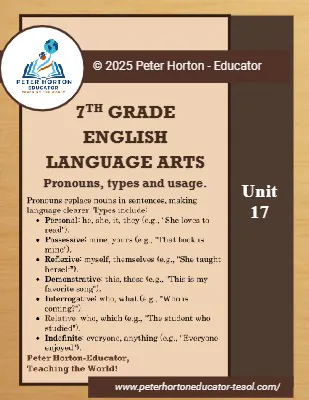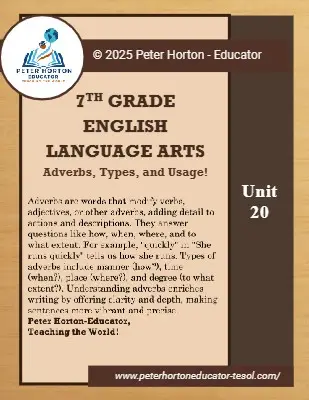7th English Language Arts Unit 9
The Importance of Everyday Vocabulary
Vocabulary is like a treasure chest of words that we use to express ourselves and understand others. Imagine trying to build a house without the right tools; that’s what it’s like learning a language without a strong vocabulary. Knowing more words helps you read, write, and speak better. It makes your communication clearer and more interesting. So, diving into new words is like unlocking new abilities and adventures in the world of English.
Unit 9: The Importance of Vocabulary
What is Vocabulary? Why is it Important?
First, let’s ask ourselves: What is the most essential part of learning a language—Speaking, Reading, Listening, Writing, Grammar, or Vocabulary? To explore this, please start by reading the story on page one of my book.
After reading, can you tell me about the grammar points at the bottom of page one?
Next, share your thoughts: What do you think of the story?
By the way, the book above is an E-Book. So, what is the author trying to convey about the book?
Moreover, if you don’t see the words clearly, consider this: Can you really speak a language without knowing words? For instance, if you know 20 words, can you write a book? Even if you know 100 words, are you able to write a book? Keep in mind, a person needs at least 650 words to understand 65% of everyday English.
Consequently, how about writing a story for my book? Use 100 words. First, decide what you are going to write about.
Why Learn English?
Now, I want to express the following thoughts about letters and words:
Letters of the alphabet represent images in our minds.
Additionally, letters can convey emotions.
Also, letters are the foundation of languages.
Furthermore, letters can express different cultures.
Words are made up of letters and can express various things, such as ideas, beliefs, feelings, attitudes, and more.
Therefore, words are the foundation of a language, just as bricks are the foundation of a house.
Indeed, words shape people’s lives, beliefs, customs, likes, loves, countries, and power.
Moreover, words have the power to influence people.
Consequently, sentences are made up of words and must be constructed correctly to express ideas, opinions, feelings, desires, wants, needs, and more. Therefore, the correct usage of words is crucial in conveying the intended message.
What are your thoughts on one word and words that go together? Please share them.
The Magic of Letters and Words
Imagine a world where each alphabet letter is a key, unlocking images and stories in our minds. Indeed, these keys, or letters, are like the colors on a painter’s palette, each capable of conveying a rainbow of emotions. They are the first notes in the symphony of languages, the fundamental sounds from which all words spring forth. Just as a key opens a door to a new world, similarly, a word opens the door to a new idea, a new image, or a new story. Therefore, they are the tools of our imagination, allowing us to explore new worlds and understand new perspectives.
Moreover, letters, like the DNA of cultures, hold a piece of history, a breath of tradition, and a glimpse into the souls of people. For example, the elegant curves of an ‘S’ or the bold lines of a ‘T’ are not just simple shapes; rather, they are the characters of countless tales and the echoes of ancient civilizations, resonating with each of us, regardless of our origins. For instance, the letter ‘A’ symbolizes the beginning in many languages, marking the start of countless stories, while the letter ‘B’ represents the concept of duality, reflecting the complex nature of human existence. These examples show that letters are not just abstract symbols but living entities that have shaped our understanding of the world.
Now, let’s talk about words. Words are the building blocks of our language, much like bricks are to a house. As bricks are laid one on top of the other to form walls, similarly, words are strung together to form the structure of our language. Consequently, they come together to form the walls of our conversations, the rooms of our stories, and the roofs of our songs. Each word is a brick, laid with precision and care to construct the grand edifice of communication.
Words are not just tools; indeed, they are catalysts of change. They can shape destinies and mold beliefs. They can whisper love or shout defiance. Furthermore, they can build bridges between hearts or walls between nations. Therefore, we can share our deepest feelings, wildest dreams, and most cherished hopes with words. In our hands, they become the architects of our world.
Consider the word ‘freedom.’ It’s more than just seven letters strung together; indeed, it’s a concept that has ignited revolutions and soothed souls. Moreover, it’s a word that goes hand in hand with others like ‘justice,’ ‘equality,’ and ‘peace,’ forming a mosaic of ideals many strive for. Similarly, the word ‘love’ encapsulates many emotions and experiences, from love between friends to a parent’s love for their child. These examples show that words can carry a wealth of meaning, and by exploring these meanings, we can deepen our understanding of the world.
Sentences are not just structures; indeed, they are gardens where words bloom. A well-constructed sentence is not just a combination of words; it is as beautiful as a sunrise, as powerful as a storm, or as comforting as a gentle breeze. Therefore, the correct usage of words in sentences is not just crucial; it’s the difference between a wild, untamed field and a carefully curated garden—a masterpiece of communication.
One word can stand alone, strong and proud, like a solitary tree on a hilltop. However, when words go together, they become a forest, a community of ideas that can shelter, inspire, and sustain us. They can be as harmonious as a choir or as diverse as a bustling city street.
So, what are my thoughts on one word and words that go together? A word can spark a thought, ignite a feeling, or inspire an action. But when words join forces, they create stories, paint pictures, and compose the music of humanity. Therefore, they are the threads that weave the tapestry of human experience, each vital and precious. Just as a symphony is a harmonious arrangement of different musical notes, words are the harmonious arrangement of different sounds and meanings. Consequently, they create a rhythm, a melody, and a harmony that resonates with our souls and brings beauty to our lives.
In conclusion, letters and words are the essence of our expression. They are the tools we use to explore the depths of the human heart and the heights of the human mind. Therefore, cherish each letter, savor each word, and celebrate the magic they create when they come together. Remember, every sentence you craft is a brushstroke in the masterpiece of your communication.











